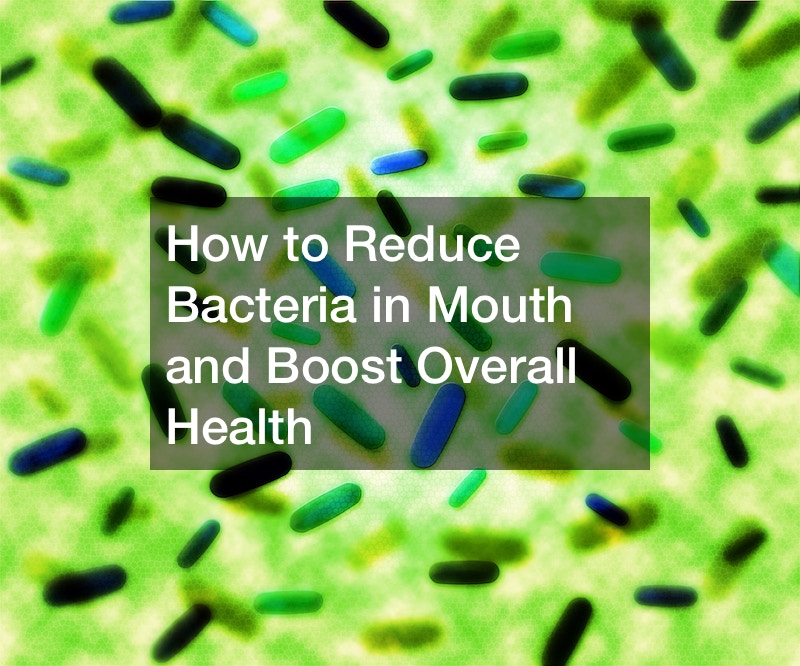
Bacteria in the mouth can lead to cavities and tooth decay. While regular brushing and flossing help keep your teeth clean, taking additional precautions could boost your health. If you’re unsure how to reduce bacteria in mouth, these suggestions can improve your health.
Look at Your Gut Health

If your digestive system is out of balance, these imbalances could harm your oral health. Bacterial imbalances in the gut increase the risk of health problems like acid reflux, which can damage tooth enamel. Digestive issues could also elevate your risk for tooth decay and gum disease.
Not only can poor gut health lead to oral health problems, but oral health issues can bring about dental health problems. Visiting an expert, like a pelvic floor doctor, could help you resolve these issues while improving your oral and gut health. If you have bacteria in your gut or mouth that are contributing to health problems, you should take steps to find a solution.
Aside from visiting experts, you can make lifestyle changes that improve the balance of bacteria in your gut microbiome. Make a point of eating a varied diet, including high-fiber and fermented foods. Adjusting your diet can be helpful when determining how to reduce bacteria in mouth.
Don’t Forget About Your Tongue
Your tongue takes up a lot of space in your mouth. Even when you’re regularly brushing and flossing, you could wind up with a lot of bacteria in your mouth if you don’t keep your tongue clean. That’s why you should make sure you’re brushing or scraping your tongue after every meal.
The surface of your tongue is an ideal breeding ground for bacteria. In fact, if you haven’t cleaned your tongue recently, it’s likely covered in bacteria right now! That bacteria can spread from your tongue to the rest of your mouth, leading to numerous dental issues. When you fail to keep your tongue clean, it can also leave you with bad breath!
You should brush your teeth at least twice daily and do the same thing with your tongue. If you’re having difficulty cleaning your tongue with a normal toothbrush, pick up a tongue scraper that will make it easier to clean your tongue. If you want to learn how to reduce bacteria in mouth, you should make sure you’re not neglecting your tongue.
Observe Your Rate of Tooth Decay

Tooth decay occurs over a long period of time, not in an instant. If your teeth seem to be decaying quickly, other factors may be contributing to your tooth decay. Monitoring your teeth closely will help you identify issues that are damaging your teeth.
We all have bacteria inside of our mouths. When you eat food, the bacteria in your mouth digest food particles left behind after you swallow. These pieces of food become acids and eventually form plaque. That plaque is what causes cavities and other forms of tooth decay.
If you notice a high tooth decay rate, you may want to start using toothpaste that contains fluoride. Fluoride can make your teeth more resistant to the acids created by bacteria. Some mouthwashes also contain fluoride and antiseptic ingredients that can kill plaque-causing bacteria.
The next time you visit your dentist, you may want to ask about tooth decay treatment, such as a dental sealant. If you’re struggling to figure out how to reduce bacteria in mouth, a sealant could protect your teeth and reduce the risk of tooth decay. Start paying closer attention to your teeth to see if certain issues should be addressed.
Start Chewing Gum
While the saliva in your mouth can combine with bacteria to form acids, you shouldn’t keep your mouth dry. A dry mouth can harm your teeth, making it harder to maintain a healthy balance of bacteria. It greatly increases your risk of developing gum disease or tooth decay. Dryness may even increase the likelihood of mouth infections like oral thrush.
If you have chronic dry mouth, one of the easiest and most effective ways to address the problem is to start chewing gum! When you chew gum, it naturally induces your mouth to produce more saliva. This substance helps you swallow and digest the food you eat while preventing food particles from being digested by bacteria.
While gum can benefit your oral health, you should make sure you choose the right type of gum. Instead of buying sugary gum, look for gum that contains a naturally occurring sweetener called xylitol. Since mouth bacteria can’t digest xylitol, it can help you balance your mouth’s pH levels.
Once you get into the habit of chewing gum, you’ll find yourself always reaching for a stick of gum! Establishing these kinds of habits can help as you strive to determine how to reduce bacteria in mouth. Gum is also an effective treatment for nausea and can give you minty fresh breath!
Alleviate Stress in the Body

Stress is unavoidable, but it could affect your oral health if your stress levels are extremely high. During periods of high stress, the body flushes out minerals that naturally protect our teeth, leaving more bacteria in our mouths. In addition, it’s common for people to grind their teeth during periods of high stress.
Finding better ways to manage your stress could help you lower bacteria levels in your mouth. If you’re struggling with chronic aches and pains, look for ways to get the relief you need. The right lower back pain treatment could address the root cause of your pain and help you manage that pain more effectively.
You should also practice self-care. Don’t be afraid to treat yourself to soothing, relaxing activities, like a facial care service or a massage. Make time for the activities you enjoy, and look for ways to unwind when you’re tense. An important part of learning how to reduce bacteria in mouth is finding ways to take better care of yourself.
Sign Up for Better Insurance
There’s only so much that you can do to keep your teeth healthy at home. Regular visits to a dentist are key if you want to maintain good oral health. Some insurance policies offer limited benefits when it comes to dental care. If this is the case for you, look for a better plan that will provide the coverage you need.
You may want to see if you qualify for Medicare insurance. While coverage can vary from state to state, a Medicare plan could enable you to get regular dental checkups. A plan may cover other treatments and therapies, such as tooth cleaning or dental sealants. If you’re not eligible for Medicare, look at other plans instead.
In the short-term, cheaper insurance with limited dental coverage might seem like a good way to cut costs. However, it could lead to more expensive problems in the long run, like cavities or gum disease. Start looking at how to reduce bacteria in mouth and see if you’d benefit from an insurance policy with better dental coverage.
Increase Your Intake of Healthy Bacteria

It’s important to remember that not all bacteria are harmful. Some types of bacteria can improve your health. You can boost healthy bacteria and reduce the presence of harmful bacteria by increasing your intake of probiotics. Probiotics are live bacteria that are known to have health benefits.
You can find probiotics in many foods. For example, yogurt is a common source of probiotics. The same goes for beverages like kombucha. If you’d prefer not to get your probiotics by eating certain foods, you could also take supplements. A type of bacteria known as lactobacilli can particularly benefit your mouth. It’s found in supplements and other products, like lozenges and chewing gum.
While it can be helpful to figure out how to reduce bacteria in mouth, you should keep in mind that bacteria isn’t always bad. What’s key is finding ways to keep your mouth and body in balance. If you take steps to reduce the presence of harmful bacteria and also consume more healthy bacteria, you should be able to keep the pH of your mouth at a beneficial level.
Consult With Your Doctor
People frequently treat dental and physical health as separate things, but these issues are directly connected. If your body is unhealthy, it can affect your teeth. Dental problems may increase your risk of developing severe health conditions, so it’s crucial to take your oral health seriously.
If you’ve noticed any concerning health symptoms, visit a medical center and bring them to the attention of your doctor. Some health symptoms, like frequent bloating, sleep issues, or constipation, could indicate issues with your gut microbiome. Your doctor can help treat these issues, benefiting your body and teeth.
Monitor your health closely and quickly address any ailments that develop. You may want to ask your doctor about IFAK medical kits, which contain supplies that you can use to protect yourself or loved ones during an emergency. Talking to your physician about lifestyle changes that could improve your gut health is also a good idea.
When figuring out how to reduce bacteria in mouth, don’t just focus on dental care. Medical care should also be a part of the process. Remember that your entire body is connected. When you take better care of your body, you’ll be taking better care of your teeth as well.
Drink More Water

Sugary beverages can increase bacteria levels in your mouth and are a common cause of tooth decay. Highly acidic beverages, like coffee and orange juice, also have the potential to be damaging. It can be hard to give these drinks up, but swapping them out for water is a great way to improve your oral health.
Every time you drink a glass of water, it helps to wash away food particles inside of your mouth. This stops bacteria from digesting those foods and turning them into acid. Increasing your intake of water can also keep bacteria from breeding. If you stay hydrated, the bacteria levels in your mouth will eventually become lower.
Try to get in the habit of sipping water throughout the day. Carry a water bottle and drink regularly, even if you’re not feeling thirsty. When you’re learning how to reduce bacteria in mouth, you need to make sure you keep your mouth hydrated. Drinking more water can improve your oral health!
Consider Alternative Treatments
While brushing and flossing are standard dental care for a reason, you may also want to explore alternative treatments that could help balance bacteria levels in your mouth and body. For example, green tea offers many of the same benefits as fluoride. You may want to replace your morning cup of coffee with this beverage.
As mentioned above, dietary changes are an excellent way to balance bacteria in the body and can also help you control bacteria in the mouth. For example, licorice root has dental benefits. Some fruits, like strawberries, contain citric acid that can make your teeth look whiter.
While health should be your top priority, remember that there are cosmetic treatments that could help if you’re unhappy with the appearance of your teeth. You don’t necessarily need plastic surgery, but dental implants or veneers could transform your smile. These treatments can be costly, but many patients consider the expense to be worthwhile.
Aside from caring for your teeth, you should ensure that you give your pet the dental care it needs. Pets can suffer from tooth decay and gum disease like humans, and animals may need pet surgery if they develop serious dental issues. Contact your veterinarian to find ways to care for your pet’s teeth.
A bacteria buildup can take a toll on your teeth, but you can improve your oral health and overall well-being if you maintain a healthy balance of bacteria. From dental checkups to lifestyle changes, there are plenty of ways to balance the bacteria in your mouth and gut. Follow this advice if you’re trying to figure out how to reduce bacteria in mouth.
